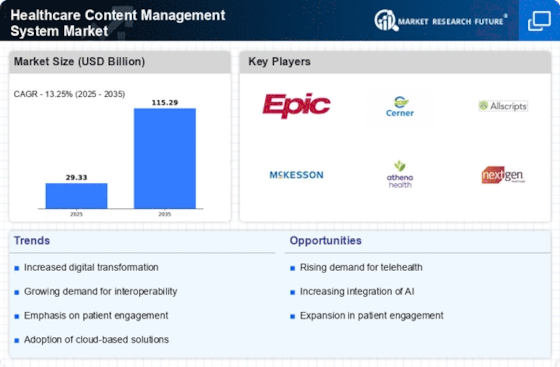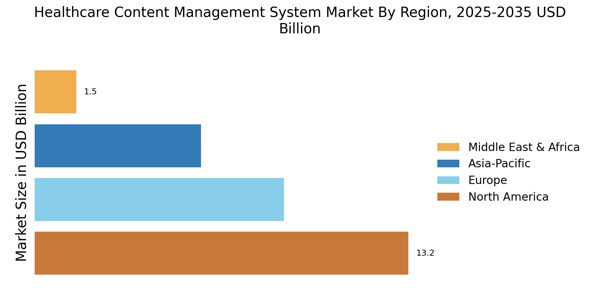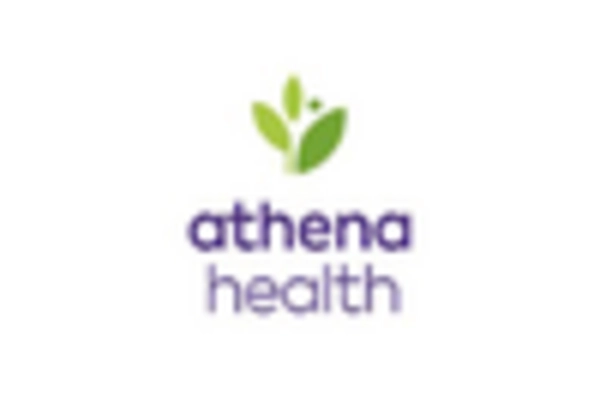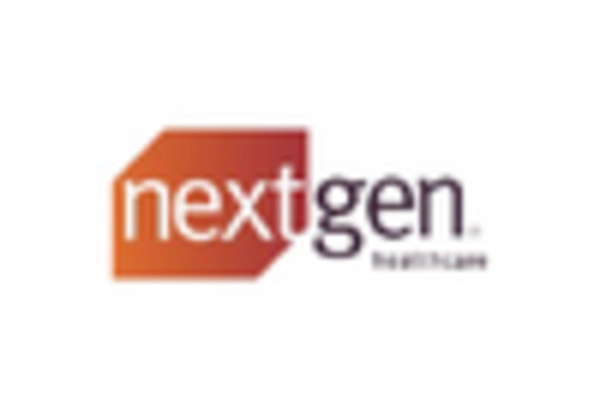Expansion of Telehealth Services
The expansion of telehealth services is significantly influencing the Healthcare Content Management System Market. As healthcare providers increasingly adopt telehealth solutions, there is a corresponding need for content management systems that can support remote patient interactions and information sharing. The telehealth market is projected to grow at a compound annual growth rate of over 25% in the coming years, indicating a robust demand for integrated content management solutions. These systems must facilitate the delivery of educational materials, appointment scheduling, and follow-up communications in a virtual environment. The rise of telehealth not only enhances access to care but also necessitates advanced content management capabilities, thereby driving growth in the Healthcare Content Management System Market.
Growing Need for Interoperability
Interoperability is becoming increasingly crucial in the Healthcare Content Management System Market as healthcare providers strive for seamless data exchange across various platforms. The ability to share information efficiently among different systems is essential for coordinated care and improved patient outcomes. According to industry reports, approximately 80% of healthcare organizations recognize the need for interoperable systems to enhance care delivery. This growing demand is likely to drive the development of content management systems that support interoperability standards, enabling healthcare providers to access and share patient information effortlessly. As the industry moves towards integrated care models, the emphasis on interoperability will continue to shape the Healthcare Content Management System Market.
Rising Demand for Patient-Centric Solutions
The Healthcare Content Management System Market is experiencing a notable shift towards patient-centric solutions. As healthcare providers increasingly prioritize patient engagement and satisfaction, the demand for systems that facilitate personalized communication and information sharing is on the rise. This trend is underscored by the fact that approximately 70% of patients express a preference for digital communication with their healthcare providers. Consequently, healthcare content management systems that enable tailored content delivery and interactive features are becoming essential. This shift not only enhances patient experience but also improves health outcomes, as informed patients are more likely to adhere to treatment plans. The growing emphasis on patient-centricity is likely to drive innovation and investment in the Healthcare Content Management System Market.
Increased Focus on Data Security and Privacy
In the current landscape, the Healthcare Content Management System Market is witnessing an intensified focus on data security and privacy. With the rise in cyber threats and data breaches, healthcare organizations are compelled to adopt robust content management systems that ensure compliance with stringent regulations such as HIPAA. The market is projected to grow as organizations seek solutions that not only protect sensitive patient information but also enhance operational efficiency. According to recent estimates, the healthcare data security market is expected to reach USD 125 billion by 2027, indicating a substantial investment in secure content management systems. This heightened awareness of data security is likely to propel the demand for advanced healthcare content management solutions that prioritize patient confidentiality and regulatory compliance.
Integration of Artificial Intelligence and Machine Learning
The integration of artificial intelligence (AI) and machine learning (ML) technologies is emerging as a pivotal driver in the Healthcare Content Management System Market. These technologies facilitate the automation of content management processes, enabling healthcare organizations to streamline operations and enhance decision-making. AI-driven analytics can provide insights into patient behavior and preferences, allowing for more effective content delivery. Furthermore, The Healthcare Content Management System Market is projected to reach USD 45 billion by 2026, suggesting a significant investment in AI capabilities within healthcare content management systems. This integration not only improves efficiency but also enhances the overall quality of care, making it a critical factor in the ongoing evolution of the Healthcare Content Management System Market.
.png)

















